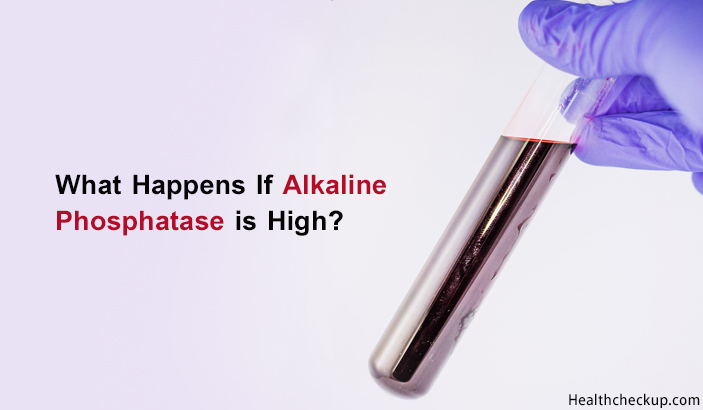What is Alkaline Phosphatase?
Alkaline phosphatase is naturally found in various tissues in the body. Commonly, it’s found in the digestive system, liver, bones, pancreases, and kidneys. Usually, it’s a combination of important enzymes such as the intestinal alkaline phosphate, placenta alkaline phosphates, and non-specific alkaline phosphate. A higher concentration of the alkaline phosphatases is found in the bone and the liver.
In adults, the recommended normal alkaline phosphates range is 20-140U/L. In children, it should not exceed 350 U/L. A higher level of alkaline phosphatase, however, can be an indication that everything is not okay. In most cases, higher levels of alkaline phosphates are closely associated with bone disorders, liver damage, liver disease, or a blocked bile duct.
High alkaline phosphatase symptoms include fatigue and weakness, nausea and vomiting, weight loss, fever, itching, yellow skin, dark urine, abdominal pain, and many more. In most cases, high levels of alkaline phosphatase are usually temporary and don’t pose a serious concern. However, to be safe, it’s important to talk to the doctor to understand more about what is causing the high ALP level.
Importance of Alkaline Phosphatase
Alkaline phosphatase is important to the body in various ways. First, alkaline phosphatase helps in the mineralization of the bones and teeth. It helps to avoid early loss of teeth in children and teenagers and prevents dental and weakened bones problems in adults.
In addition, alkaline phosphatase is very important in the formation, development, and the survival of the embryo. It promotes the growth of the fetal and the embryonic cells. Furthermore, it is important in the synthesis of proteins in the body. Also, it has the capability to hydrolyze RNA and DNA.
High Alkaline Phosphatase Symptoms
Symptoms of elevated alkaline phosphatase in the body are related to the specific disorder that causes the increase in the alkaline phosphatase levels. Below are some of the conditions that cause elevated ALP levels and their respective symptoms.
- Biliary Obstruction- It’s also referred to as bile duct obstruction. According to Maryland Medical Center University, biliary obstruction is the blockage of the bile duct which is responsible for transporting bile from the liver to the small intestines and the gallbladder. It can be caused by several factors such as gallstones, cyst, enlarged lymph nodes, and many more. Common symptoms associated with biliary obstruction include jaundice, fever, dark urine, pale colored stool, nausea, and vomiting.
- Rickets- Rickets is a disorder that affects the bones making them soft and weak or easily fractured. The main cause of rickets is a deficiency of vitamin D and can also be inherited. Common signs and symptoms of rickets include abnormally curved spine, delayed growth, weak muscles, thick wrists and ankles, and bowed legs.
- Liver Cirrhosis- It’s a progressive condition of the liver. It causes the liver to deteriorate over time eventually leading to the malfunctioning of the liver. This disrupts the liver’s ability to remove toxins, control infections, and process nutrients. Associated signs and symptoms include itching, abdominal pain, spider like blood vessels, fatigue, itching skin, weight loss, vomiting, and decreased appetite.
What Causes Elevated Alkaline Phosphatase?
- Pregnancy- The placenta, at the beginning of the third trimester, produces high levels of alkaline phosphatase enzymes. It tends to increase the maternal values beyond their normal range. The increase is important in the synthesis of proteins, calcification of the cartilage, and the bones. It stays for some time after birth.
- Liver Disease- Different forms of liver diseases can change and increase the levels of the alkaline phosphatase.
- Bone Disease- The bone disease is among the most common causes of elevated alkaline phosphatase. However, with proper and timely diagnosis, it can be treated and the values of the ALP can return to normal.
- Obesity- Studies claim that increased alkaline phosphatase levels are common in people who are obese. Elevated alkaline phosphatase levels lead to the inconsistent intracellular fat depots which release itself into the bloodstream.
- Cancer- Cancer causes elevated levels of alkaline phosphatase in the bodies of the patients. Mostly, it’s found in the liver and the bones. A recent study compared healthy women and women with breast cancer. The study claimed that those women who had breast cancer had elevated alkaline phosphatase as compared to those who were normal. Increase in the ALP also shows the spread of cancer in the body.
- Birth Control Pills- Birth control pills tend to increase the levels of alkaline phosphatase beyond the normal range.
What Happens if Alkaline Phosphatase is High?
As seen above, elevated levels of alkaline phosphatase are closely associated with cancer, bone, kidney, and liver. The following are the common conditions that are closely associated with increased alkaline phosphatase.
- Colon and Liver Cancer
- Biliary Obstruction
- Leukemia
- Breast Cancer
- Epilepsy
- Vitamin D deficiency
- Paget’s Disease
- Alzheimer’s
- Hyperthyroidism
- Heart Disease
How To Lower Alkaline Phosphatase?
High levels of alkaline phosphatase can be controlled by various factors such as medication, physical activities, proper diet, and proper lifestyle. Below are some of the ways to lower elevated alkaline phosphatase
- See the doctor. Before choosing a certain treatment that can lower the alkaline level, it’s important to talk to a doctor. This way, you will be able to able to understand the cause of the high ALP levels and the respective effective treatment needed. Also, further treatments may be needed to reduce the chances of development of serious health compilations such as cancer.
- There are medications that can help lower the levels of alkaline phosphatase. For instance, if you have a liver disease, the doctor can prescribe the necessary medications to those specific conditions. This will not only help reduce the signs and symptoms of the disorder but also will reduce and normalize the levels of alkaline phosphatase.
- Eliminate foods rich in nutrients that increase the levels of ALP. For instance, zinc is a structural element of the alkaline phosphatase enzyme. Therefore, reducing the intake of food rich in zinc can help lower the levels of alkaline phosphatase in the body. Foods high in alkaline phosphatase include beef, lamb, mutton, spinach, pumpkin seeds, and many more.
- Eat foods that help in regulating the various enzymes in the body. For instance, copper has proven to reduce high levels of ALP. These foods include almonds, dark chocolate, lentils, sunflower seeds, and many more. You can also speak to the doctor about the effective foods to regulate your alkaline phosphatase levels. These can also include dairy products.
- Have enough levels of vitamin D in the body. Vitamin D deficiency is one of the main causes of elevated alkaline phosphatase. Enough exposure to the sun can help increase the levels of vitamin D in the body. Sunlight helps your body to produce vitamin D. fish can also increase vitamin D.
- Removal of Medication– Certain medications are associated with high alkaline phosphatase. They include drugs such as birth control pills, narcotic medication, antidepressants, steroids, anti-inflammatory drugs, and harmonic drugs.
- Include an exercise program– It’s important to stay physically fit.
In conclusion, levels of alkaline phosphatase in the body can be determined through a blood test. Also, high alkaline phosphatase symptoms should be controlled by treating the underlying condition.
Medically Reviewed By

Catherine is a dedicated freelance health and science writer committed to excellence and professionalism. She specializes in health topics including diet and nutrition, immune-related diseases, surgery, and cancer.









